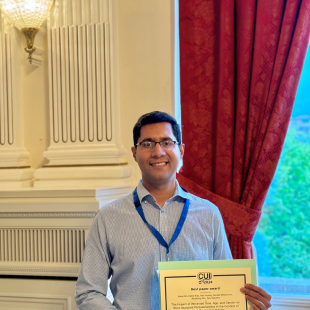
Sabid Bin Habib Pias, a Ph.D. student in Computer Science at the Luddy School of Informatics, Computing, and Engineering, was the lead author in a paper that won best-paper honors at the prestigious ACM Conversational User Interface Conference in Luxembourg.
The paper, The Impact of Perceived Tone, Age, and Gender on Voice Assistant Persuasiveness in the Context of Product Recommendations, focused on helping people become more comfortable in using Voice Assistants, which can assist users in everyday tasks, specifically for more intricate tasks such as online shopping. The study analyzed whether the vocal characteristics of Voice Assistants (VAs) can be effective tools to persuade users and increase user engagement in online shopping.
“This is a significant honor, especially given the presence of numerous outstanding and exemplary papers at the conference,” said Sabid, whose research focuses on human-centered artificial intelligence. “This recognition is particularly special because it comes from a community deeply focused and experienced in conversational interface research, which underscores the value and impact of this achievement.”
Co-authors and advisors were Apu Kapadia, Luddy associate dean for graduate studies and professor of Computer Science, Minjeong Kim, merchandising professor and program director, Eskenazi School of Art, Architecture and Design; Ran Huang, associate professor IU; and Donald Williamson, former Luddy assistant professor of Computer Science and current assistant professor at The Ohio State University.
“The motivation for this research lies in the growing integration of VAs in everyday tasks and the potential to enhance their effectiveness through the vocal attributes of the Voice Assistants,” Sabid said.“This paper aims to identify strategies for designing voice assistants that effectively enhance user engagement. Additionally, we emphasize the importance of tackling the potential negative impacts associated with these integrations.”
The biggest advantage in using voice assistants more frequently, Sabid added, is the significant enhancement of the hands-free convenience they offer.
“This allows users to perform a wide range of tasks more efficiently and effortlessly, such as information seeking, controlling smart home devices, managing schedules, and online shopping, without the need for manual input,” he said. This convenience is particularly beneficial for individuals with disabilities, the elderly, and those with busy lifestyles, as it provides a more accessible and intuitive way to interact with technology.
The three-day, mid-July conference’s central theme centered on trustworthy conversational agents, which have a crucial role in building trust between humans and machines. The goal was to inspire and promote innovative research and development by bringing together researchers, industry experts and practitioners.

